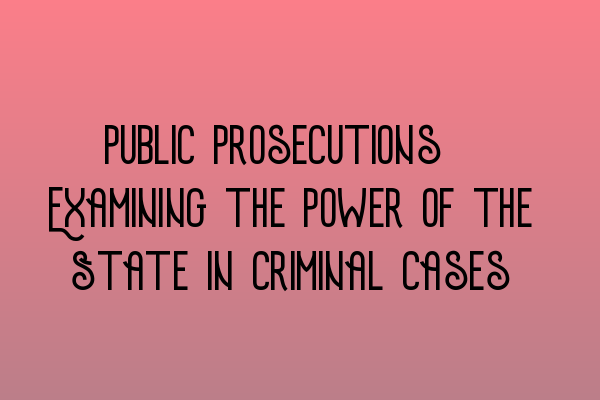Public Prosecutions: Examining the Power of the State in Criminal Cases
When it comes to criminal cases, one cannot underestimate the power of the state in prosecuting individuals. Public prosecutions play a crucial role in the criminal justice system, as they represent the government’s authority to enforce the law and hold individuals accountable for their actions.
Public prosecutors have the responsibility to investigate and prosecute crimes committed within their jurisdiction. This involves gathering evidence, assessing its strength, and making the determination whether to proceed with formal charges. It is their duty to ensure that justice is served and that the interests of the public are safeguarded.
The power vested in public prosecutors is immense, as they have the authority to deprive individuals of their liberty through incarceration. This highlights the need for a fair and impartial prosecution process, where all individuals are granted their rights and are given an equal opportunity to defend themselves.
Public prosecutions are guided by legal principles and ethical considerations. They must adhere to due process, which entails following established rules and procedures to ensure fairness and protect the rights of the accused. This includes disclosing all relevant information to the defense, allowing for cross-examination of witnesses, and presenting a case based on valid evidence.
It is crucial for prosecutors to act in the best interests of justice and not be influenced by external pressures. Their role is not to secure convictions at all costs, but rather to ensure that the guilty are held accountable and the innocent are protected. This requires a deep understanding of the law, as well as the ability to exercise discretion and make sound judgments.
The Role of Public Prosecutors
Public prosecutors play a multifaceted role in the criminal justice system. They act as advocates for the state, representing the interests of the public. Their primary goal is to seek justice, which includes determining guilt or innocence and, where applicable, negotiating plea deals.
In addition to their courtroom duties, public prosecutors also engage in pre-trial activities, such as conducting investigations, reviewing evidence, and interviewing witnesses. They are responsible for building a strong case against the accused, while ensuring that all information is presented fairly and accurately.
Public prosecutors also have the power to decide whether to proceed with charges, drop charges, or negotiate lesser offenses. This discretion allows for flexibility in handling cases and taking into account the circumstances and intentions of the accused.
The Influence of Public Prosecutions on Criminal Cases
Public prosecutions have a significant impact on criminal cases. They are responsible for presenting evidence and arguments to convince the court of the accused’s guilt. Their skills in presenting a strong case can heavily influence the outcome of a trial.
However, the power of public prosecutions must be balanced by the rights of the accused. This is where the role of defense attorneys becomes critical. Defense attorneys act as a counterbalance to the state’s power, ensuring that the accused is given a fair chance to challenge the evidence presented by the prosecution.
The adversarial nature of the criminal justice system requires that both the prosecution and defense vigorously advocate their respective positions. This ensures that all relevant evidence is considered, all legal arguments are heard, and the truth can be ascertained through the process of examination and cross-examination.
In conclusion, the power of the state in public prosecutions cannot be understated. Public prosecutors have immense authority to investigate, charge, and try individuals accused of criminal offenses. However, this authority must be exercised with utmost care to safeguard the rights of the accused and ensure justice is served.
For more information on criminal law and practice, including preparation for the SQE exams, check out our SQE 1 Practice Exam Questions and SQE 1 Practice Mocks FLK1 FLK2. If you’re looking for preparation courses, be sure to visit our SQE 2 Preparation Courses and SQE 1 Preparation Courses. Stay informed about SRA SQE exam dates by visiting our SRA SQE Exam Dates page.
